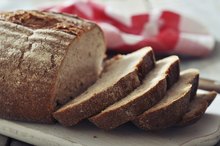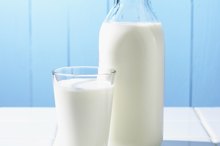Farmer Cheese Nutrition
Farmer cheese is a fresh cheese made from cultured and pasteurized milk, a cheese coagulator such as rennet and sald. With a mild taste and moist texture, farmer cheese slices easily. Eat your Farmer cheese by itself, sweeten it with powdered sugar and eat it with fruit or use it as a replacement cheese in your cheesecake or lasagna recipe. Like any cheese, Farmer cheese can be high in fat. Knowing the nutrition information can help you balance your intake.
Calories
Calories in farmer cheese can vary depending on the brand and serving size. A 1-oz. serving contains 80 calories. In comparison, a 1-oz. serving of part-skim ricotta cheese contains 39 calories 1.
- Calories in farmer cheese can vary depending on the brand and serving size.
- serving of part-skim ricotta cheese contains 39 calories 1.
Fat
What Happens to Sugar Levels in the Blood While Fasting?
Learn More
A 1-oz. serving of farmer cheese contains 6 g of total fat, 4 g of saturated fat and 15 mg of cholesterol. Foods high in fat are more calorie dense because each gram of fat contains nine calories. A balanced diet should contain 20 to 35 percent of its calories from fat, less than 10 percent from saturated fat and less than 300 mg of cholesterol.
- serving of farmer cheese contains 6 g of total fat, 4 g of saturated fat and 15 mg of cholesterol.
- Foods high in fat are more calorie dense because each gram of fat contains nine calories.
Protein
A 1-oz. serving of farmer cheese contains 6 g of protein. For healthy people, increasing your protein intake to 20 to 25 percent of calories can decrease your risk of heart disease if those high-protein foods replace refined carbohydrates such as white bread, says the Harvard School of Public Health. However, if you have diabetes or kidney disease, limit your daily protein intake to 0.8 to 1.0 g per kg of body weight per day.
- serving of farmer cheese contains 6 g of protein.
- For healthy people, increasing your protein intake to 20 to 25 percent of calories can decrease your risk of heart disease if those high-protein foods replace refined carbohydrates such as white bread, says the Harvard School of Public Health.
Carbohydrates
Calories in a Slice of Whole-Grain Bread
Learn More
Farmer cheese is a low-carbohydrate food. A 1-oz. serving of farmer cheese contains less than 1 g of carbohydrate. The U.S. Department of Agriculture's dietary guidelines recommends most of your carbohydrate choices come from fruits, vegetables and whole grains 2. A balanced diet contains 45 to 65 percent of its calories from carbohydrates.
- Farmer cheese is a low-carbohydrate food.
- A balanced diet contains 45 to 65 percent of its calories from carbohydrates.
Sodium
A 1-oz. serving of farmer cheese contains 110 mg of sodium. The USDA recommends limiting daily sodium intake to less than 2,300 mg a day. Eating foods high in sodium can increase your risk of high blood pressure. To help reduce sodium intake, look for a low-salt farmer cheese.
- serving of farmer cheese contains 110 mg of sodium.
- Eating foods high in sodium can increase your risk of high blood pressure.
Related Articles
References
- U.S. Department of Agriculture Nutrient Database: Part-Skim Ricotta Cheese
- U.S. Department of Agriculture: Dietary Guidelines for Americans: Key Recommendations
- Cheese, swiss. FoodData Central. U.S. Department of Agriculture. Published April 1, 2019.
- Cheese, part skim mozzarella. FoodData Central. U.S. Department of Agriculture. Published April 1, 2019.
- Cheese, parmesan, grated. FoodData Central. U.S. Department of Agriculture. Published April 1, 2019.
- Cheese. FoodData Central. U.S. Department of Agriculture. Published April 1, 2019.
- Nilsen R, Høstmark AT, Haug A, Skeie S. Effect of a high intake of cheese on cholesterol and metabolic syndrome: results of a randomized trial. Food Nutr Res. 2015;59:27651. doi:10.3402/fnr.v59.27651
- Rozenberg S, Body JJ, Bruyère O, et al. Effects of dairy products consumption on health: Benefits and beliefs--a commentary from the Belgian Bone Club and the European Society for Clinical and Economic Aspects of Osteoporosis, Osteoarthritis and Musculoskeletal Diseases. Calcif Tissue Int. 2016;98(1):1–17. doi:10.1007/s00223-015-0062-x
- de Goede J, Geleijnse JM, Ding EL, Soedamah-Muthu SS. Effect of cheese consumption on blood lipids: a systematic review and meta-analysis of randomized controlled trials. Nutr Rev. 2015;73(5):259-75. doi:10.1093/nutrit/nuu060
- National Heart, Lung, and Blood Institute. Food exchange lists.
- Dairy Products - Milk, Yogurt, and Cheese. American Heart Association. Reviewed April 16, 2018.
Writer Bio
Jill Corleone is a registered dietitian and health coach who has been writing and lecturing on diet and health for more than 15 years. Her work has been featured on the Huffington Post, Diabetes Self-Management and in the book "Noninvasive Mechanical Ventilation," edited by John R. Bach, M.D. Corleone holds a Bachelor of Science in nutrition.









